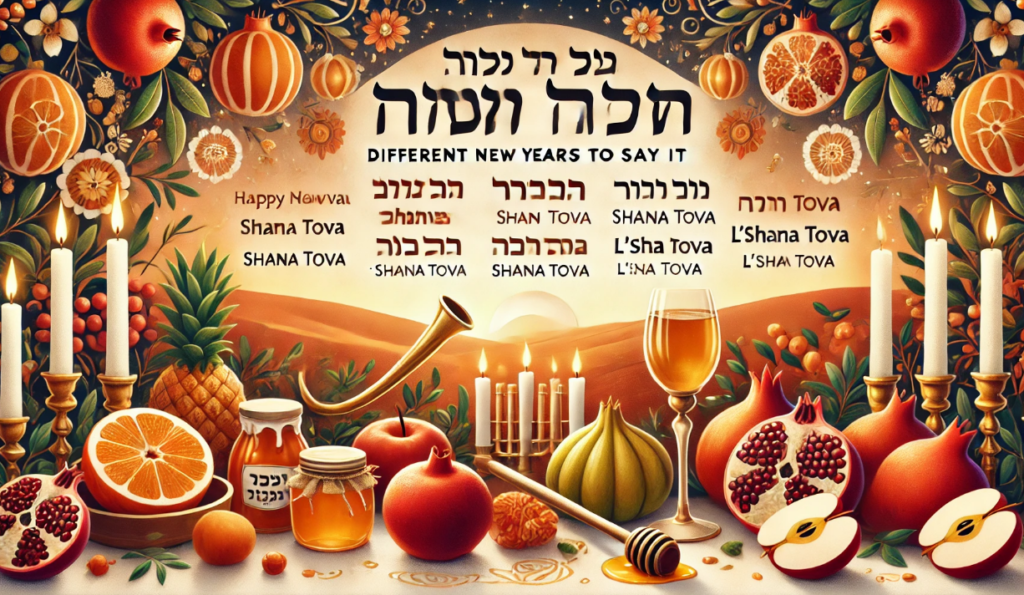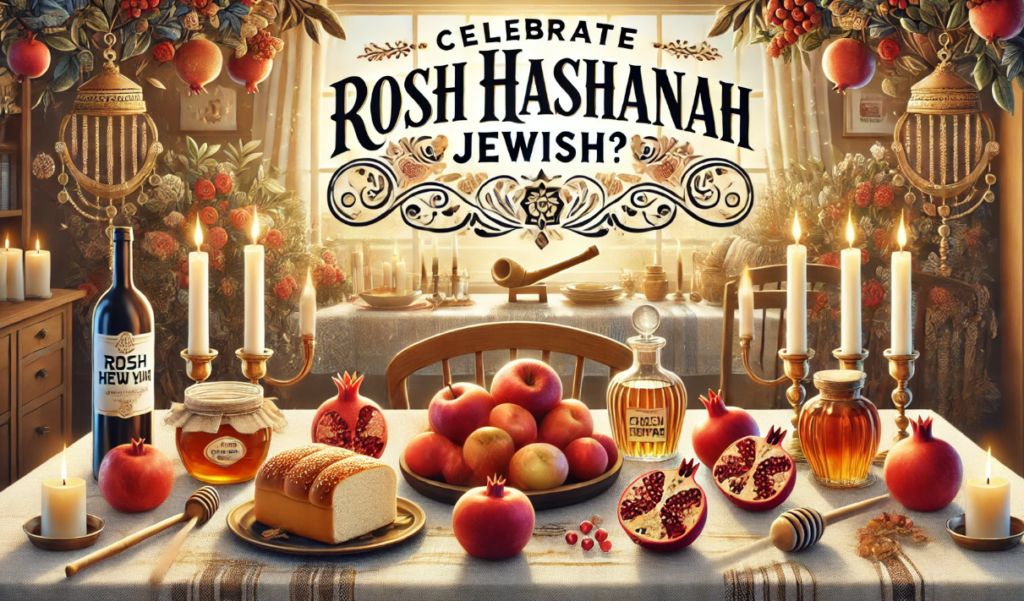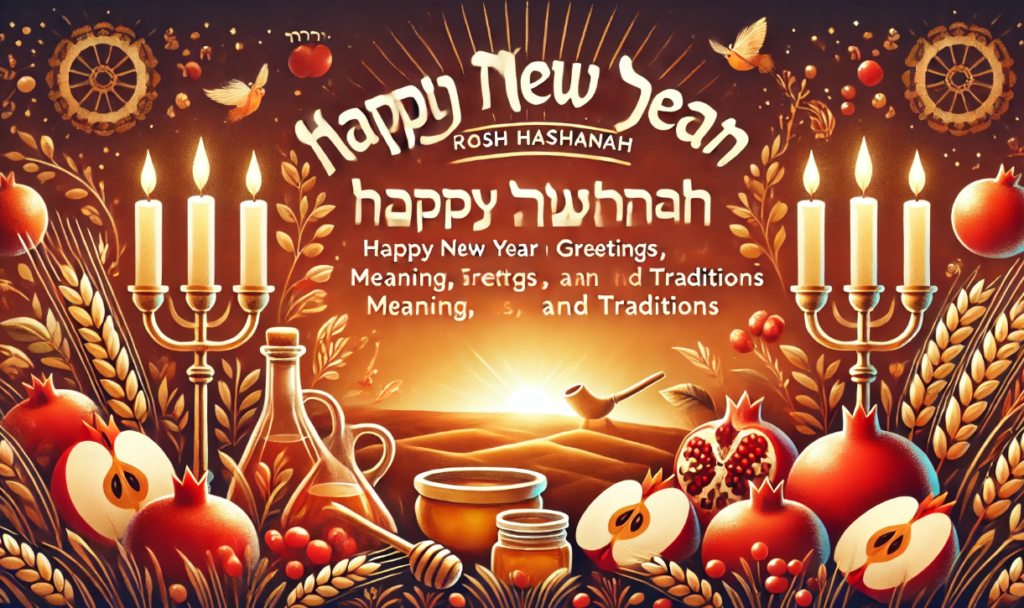Happy New Year in Hebrew is “Shana Tova” (שנה טובה), which means “Good Year.” People say this to wish their friends and family a happy and sweet new year. This greeting is used during Rosh Hashanah, the Jewish New Year, which is a special and holy time in Jewish tradition.
Rosh Hashanah is not just about saying “Happy New Year in Hebrew.” It is a time for fresh starts, prayers, and spending time with loved ones. People eat sweet foods like apples and honey to wish for a sweet year ahead. Let’s explore more about this beautiful festival, how to say Happy New Year in Hebrew, and its traditions!
Contents
- 1 What Does “Happy New Year in Hebrew” Mean?
- 2 How to Say Happy New Year in Hebrew Correctly?
- 3 Why Do Jews Celebrate Rosh Hashanah?
- 4 Common Hebrew Greetings for the New Year
- 5 Happy New Year in Hebrew: Different Ways to Say It
- 6 Meaning of “Shana Tova” and Other Hebrew Wishes
- 7 Rosh Hashanah Traditions: What Happens on This Day?
- 8 Special Foods Eaten on Rosh Hashanah for a Sweet Year
- 9 Why Do People Blow the Shofar on Rosh Hashanah?
- 10 Happy New Year in Hebrew for Beginners: Easy Words to Learn
- 11 Hebrew New Year vs. Other New Year Celebrations
- 12 How to Celebrate Rosh Hashanah Even If You Are Not Jewish?
- 13 Conclusion
- 14 FAQs
What Does “Happy New Year in Hebrew” Mean?
“Happy New Year in Hebrew” is Shana Tova (שנה טובה). This means “Good Year” in English. It is a common greeting for Rosh Hashanah, the Jewish New Year. People say it to wish happiness and success to their loved ones.
Rosh Hashanah is a very special holiday in Judaism. It marks the beginning of the Jewish calendar year. This holiday is a time of prayer, reflection, and celebration. People ask for blessings and a sweet year ahead.
How to Say Happy New Year in Hebrew Correctly?
If you want to greet someone in Hebrew, you can say “Shana Tova” or “Shana Tova U’Metuka” (שנה טובה ומתוקה). The second phrase means “A good and sweet year.” It is a beautiful way to send warm wishes.
You can also say “L’Shanah Tovah Tikatevu” (לשנה טובה תכתב), which means “May you be written for a good year.” This phrase comes from a Jewish belief that people’s fate for the next year is written on this day.
Why Do Jews Celebrate Rosh Hashanah?
Rosh Hashanah is the start of the Jewish High Holidays. It is a time for people to think about their actions and make better choices. It is also a time to thank God and pray for a blessed year.
Jewish tradition says that on Rosh Hashanah, God decides each person’s future for the year. People reflect on their past and try to be kinder and better. This holiday is about new beginnings and hope.
Common Hebrew Greetings for the New Year
Many Hebrew greetings are used on Rosh Hashanah. The most common one is “Shana Tova”. But there are other greetings you can use too!
- “Shana Tova U’Metuka” – A good and sweet year
- “L’Shanah Tovah Tikatevu” – May you be written for a good year
- “Gmar Chatima Tova” – A good final sealing (used between Rosh Hashanah and Yom Kippur)
- “Tizku Leshanim Rabot” – Wishing you many good years
Using these greetings can make people feel special and happy. They are great ways to spread joy during this holiday.
Happy New Year in Hebrew: Different Ways to Say It

There are many ways to say Happy New Year in Hebrew. Each phrase has a special meaning. Some are formal, while others are friendly.
If you want to wish someone warmly, you can say “Shana Tova U’Metuka”. This phrase adds sweetness to your wish. If you are writing a card, you can use “L’Shanah Tovah Tikatevu”. It is polite and thoughtful.
In casual conversations, “Shana Tova” is the best phrase to use. It is short, easy, and commonly understood.
Meaning of “Shana Tova” and Other Hebrew Wishes
“Shana Tova” is more than just a greeting. It carries hope and blessings. People say it with love and good intentions.
Other Hebrew wishes also have deep meanings. “Gmar Chatima Tova” is often used between Rosh Hashanah and Yom Kippur. It expresses the hope that one’s fate will be sealed in the Book of Life. This shows the spiritual importance of these greetings.
Rosh Hashanah Traditions: What Happens on This Day?
On Rosh Hashanah, people pray, eat special foods, and spend time with family. The traditions are beautiful and meaningful.
- Blowing the Shofar – A ram’s horn is blown in the synagogue as a spiritual wake-up call.
- Eating Sweet Foods – Apples dipped in honey symbolize a sweet year.
- Tashlich Ceremony – People throw breadcrumbs into water to let go of past mistakes.
- Attending Synagogue Services – Special prayers are said to ask for blessings.
These customs help people start the new year with hope and positivity.
Special Foods Eaten on Rosh Hashanah for a Sweet Year
Food plays a big role in celebrating Rosh Hashanah. Each food has a symbolic meaning.
- Apples and Honey – To wish for a sweet year ahead
- Pomegranates – To have many blessings like the seeds inside
- Round Challah Bread – To represent the cycle of the year
- Fish Head – To symbolize being a leader, not a follower
These foods make the holiday meals special and meaningful.
Why Do People Blow the Shofar on Rosh Hashanah?
The shofar is a ram’s horn that is blown on Rosh Hashanah. It has a deep spiritual meaning.
- Reminder to Reflect – The sound wakes people up to change their ways.
- Symbol of Faith – It reminds people of the biblical story of Abraham.
- Call for a Fresh Start – It signals the beginning of the new year.
Hearing the shofar is an emotional experience. It is a powerful moment in Jewish tradition.
Happy New Year in Hebrew for Beginners: Easy Words to Learn
If you are new to Hebrew, learning some words can be fun. Here are a few easy words to know:
- Shana – Year
- Tova – Good
- Metuka – Sweet
- Shofar – Ram’s horn
- Rosh Hashanah – Jewish New Year
These words will help you understand Rosh Hashanah greetings better.
Hebrew New Year vs. Other New Year Celebrations
Rosh Hashanah is different from the New Year celebrations on January 1st.
- Spiritual vs. Festive – Rosh Hashanah is a religious holiday, while New Year’s Eve is a party.
- Different Calendar Systems – Rosh Hashanah follows the Hebrew calendar, not the Gregorian one.
- Prayers vs. Fireworks – Instead of fireworks, Jews pray and reflect.
Both celebrations bring joy, but in different ways.
How to Celebrate Rosh Hashanah Even If You Are Not Jewish?

Anyone can take part in the spirit of Rosh Hashanah. Here’s how:
- Try Jewish Foods – Taste apples with honey and round challah.
- Learn Hebrew Greetings – Say “Shana Tova” to Jewish friends.
- Practice Gratitude – Reflect on your year and set new goals.
These small actions can help you appreciate the meaning of Rosh Hashanah.
Conclusion
Rosh Hashanah is a special time for new beginnings and hope. Saying Happy New Year in Hebrew brings happiness to family and friends. People pray, eat sweet foods, and wish for a good year ahead. This holiday helps people reflect on their past and look forward to the future with a kind heart.
By learning Hebrew greetings and traditions, anyone can join in the celebration. Whether you are Jewish or not, spreading love and kindness is always a beautiful way to start a new year. Shana Tova!
FAQs
Q: What does “Shana Tova” mean?
A: “Shana Tova” means “Good Year” in Hebrew. It is a common greeting for Rosh Hashanah.
Q: When is Rosh Hashanah celebrated?
A: Rosh Hashanah usually falls in September or October, depending on the Hebrew calendar.
Q: Why do people eat apples and honey on Rosh Hashanah?
A: Apples and honey are eaten to wish for a sweet and happy year ahead.
Q: What is the shofar and why is it blown?
A: The shofar is a ram’s horn. It is blown as a spiritual wake-up call on Rosh Hashanah.
Q: Can non-Jews celebrate Rosh Hashanah?
A: Yes! Anyone can learn, share greetings, and enjoy the traditions of Rosh Hashanah.
